Install the app
How to install the app on iOS
Follow along with the video below to see how to install our site as a web app on your home screen.

Note: this_feature_currently_requires_accessing_site_using_safari
You are using an out of date browser. It may not display this or other websites correctly.
You should upgrade or use an alternative browser.
You should upgrade or use an alternative browser.
Ebooks and Audiobooks Collection
OP
Member
LEVEL 6
260 XP
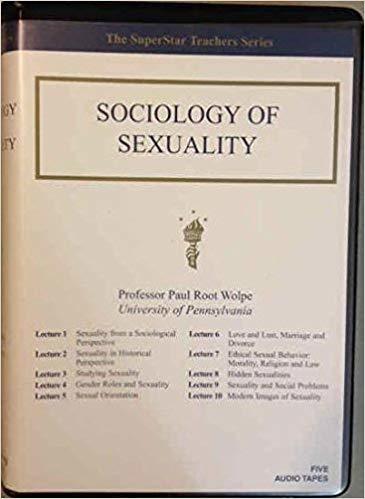
TTC Audio Sociology of Sexuality, Taught by Paul Wolpe
Published by The Teaching Company, 1995 | 10 lectures, 45 minutes/lecture, out of print, with guidebook (PDF)
MPEG 2.0 layer 3 | VBR V7| 32000Hz Joint Stereo | 292 MB
Lectures on sexuality from a sociological perspective.
Lectures:
01 Sexuality from a Sociological Perspective
02 Sexuality in Historical Perspective
03 Studying Sexuality
04 Gender Roles and Sexuality
05 Sexual Orientation
06 Love and Lust, Marriage and Divorce
07 Ethical Sexual Behavior Morality, Religion and Law
08 Hidden Sexualities
09 Sexuality and Social Problems
10 Modern Images of Sexuality
About Professor :
Paul Root Wolpe is currently a Senior Scholar on the faculty of the Center for Bioethics at
the University of Pennsylvania, and is on the faculty of the Department of
Sociology at Perm, where he has taught for the past nine years.
Wolpe is the author, with Janell Carroll, Ph.D., of Sexuality and Gender in
Society, a textbook from HarperCollins being published in December, 1995. He
has also published in the sociological and the medical literature on topics such
as deviance, alternative medicine, bioethics, and professionalism.
Excerpt from the first lesson:
Sexuality from a Sociological Perspective
Objective
After this lecture, students should have a basic knowledge of the different
approaches that have been used to understand human sexuality. They should
also be familiar with some of the more prominent theorists in the fields,
recognizing both their contributions and the weaknesses of their approaches.
Finally, students should begin to appreciate the ways society itself molds not
only our attitudes about sexuality, but scholarly theories about sexuality;
theorists are also socialized into the real world and are influenced by it.
Code:
https://nitroflare.com/view/B89A60A1B942D98/Sociology_of_Sexuality.rar
Code:
https://rapidgator.net/file/e2ac0d07fec4eca8eea42ba027d19f68/Sociology_of_Sexuality.rar.html
OP
Member
LEVEL 6
260 XP
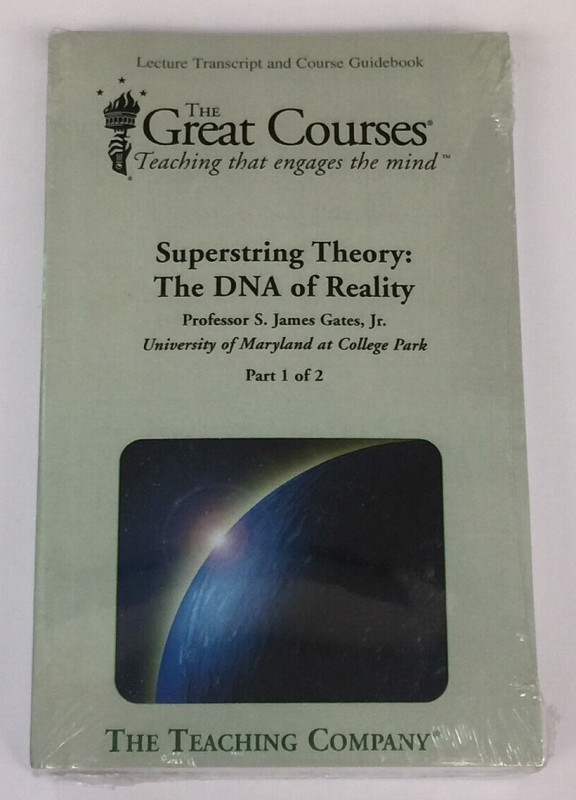
Superstring Theory: The DNA of Reality [TTC Audio]
English | 2006 | 11 hrs and 34 mins | MP3 | 636 MB
by Jr. S. James Gates
This course provides a non-technical and accessible description of the central foundational concepts and historical development of the topic in theoretical physics called superstring/M-theory. The latest advance in the epic search for the ultimate nature of physical reality, string theory is based on the concept that all matter is composed of inconceivably tiny filaments of vibrating energy. The theoretical physicists at the cutting edge of this research seek a system that unites all the forces of nature and may end up explaining events at every scale in the cosmos.
Code:
https://nitroflare.com/view/2CA1B4B82E21BB6/Superstring_Theory-_The_DNA_of_Reality.rar
Code:
https://rapidgator.net/file/e91d0b481b10a61829b1ad1047e9c099/Superstring_Theory-_The_DNA_of_Reality.rar.html
OP
Member
LEVEL 6
260 XP

The Developing Adult: Biological and Psychosocial Perspectives [TTC Audio]
English | 1996 | 11 hrs and 54 mins | WMA | 499 MB
Author: Herant Katchadourian
The Developing Adult: Biological and Psychosocial Perspectives
01 - The Concept and Study of Adulthood
02 - Physical Development in Puberty
03 - Sexual Maturation and Behavior
04 - Intellectual and Emotional Development
05 - Transition to Adulthood - The Self and Others
06 - Career Choice and Development
07 - Intimacy and Love
08 - Marriage and Parenthood
09 - Marital Satisfaction
10 - Mid-Life - Biological Aspects
11 - Midlife - Transition and Crisis
12 - Sexual Function and Dysfunction
13 - Biology of Aging and Health
14 - Psychosocial Aspects of Aging
15 - Personality - Consistency and Change
16 - Death and Mourning
Code:
https://nitroflare.com/view/D3605EECAFA48AD/The_Developing_Adult-_Biological_and_Psychosocial_Perspectives.rar
Code:
https://rapidgator.net/file/319ede33e131024d7cac7c2a0fb8b1ce/The_Developing_Adult-_Biological_and_Psychosocial_Perspectives.rar.html
OP
Member
LEVEL 6
260 XP

The American Dream [TTC Audio]
English | 1992 | 6 hrs and 4 mins | MP3 | 152 MB
Author: John K. Roth
The American Dream - John Roth
01 - The American Dream - From Its Past to Its Future
02 - A New Commonwealth
03 - Fronteir Dreams
04 - Inalienable Rights and Rugged Individualism
05 - Disenchantment and Depression
06 - Dreams Deferred - Race and Gender
07 - The American Dream and Holocaust Questions
08 - Where Have We Been, Where are We Going
Code:
https://nitroflare.com/view/1C43B0FA64CBD40/The_American_Dream_-_John_Roth.rar
Code:
https://rapidgator.net/file/8de8afa0bc26c7c52db43a32059486f4/The_American_Dream_-_John_Roth.rar.html
OP
Member
LEVEL 6
260 XP

Love and Vengeance: A Course on Human Emotion [TTC Audio]
English | 1993 | 5 hrs and 53 mins | MP3 | 243 MB
by Robert C. Solomon
01 - Love, Vengeance and the Nature of Emotion
02 - Love and Plato's Symposium
03 - Wild Justice - The Nature and Legitimacy of Vengeance
04 - Emotions and Feelings - From Aristotle to James
05 - Emotions, Intentionality and Behavior
06 - Emotions and Choice - Emotions and Existentialism
07 - Emotions and Meaning
08 - The World(s) of Emotion
Code:
https://nitroflare.com/view/CE8EC5ADE1FEC50/Love_and_Vengeance_-_A_Course_on_Human_Emotion.rar
Code:
https://rapidgator.net/file/5958a15c83ddceff53e8ec82a7969614/Love_and_Vengeance_-_A_Course_on_Human_Emotion.rar.html
OP
Member
LEVEL 6
260 XP
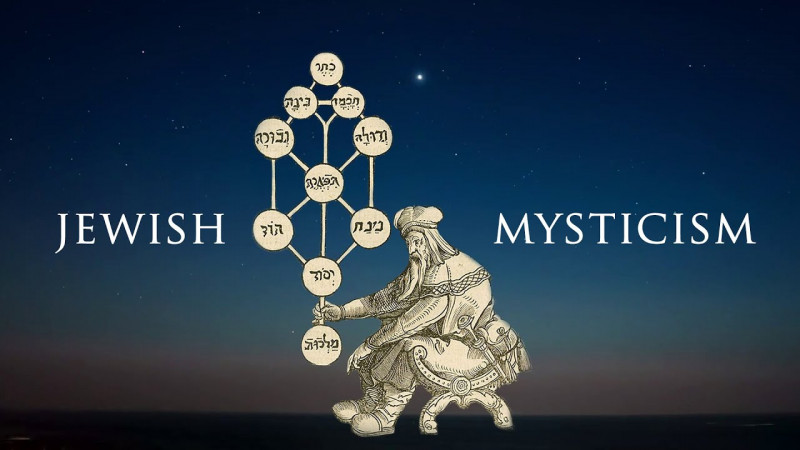
Jewish Mysticism [TTC Audio]
English | 1996 | 7 hrs and 26 mins | MP3 | 307 MB
Authors: Kalman P. Bland, Teaching Company
"These lectures begin by offering an historian's answers to two rather straightforward questions: What is Jewish about Jewish Mysticism (Kabbalah)? What is mystical about Jewish Mysticism? The lectures end with an historian's attempt to understand our contemporary fascination with such arcane subjects"--Guide
lecture 1. Historical framework for Jewish mysticism
lecture 2. Early rabbinic Judaism and mystical ecstasy
lecture 3. Triumph of spirituality in German pietism
lecture 4. Yoga, language and Abraham Abulafia
lecture 5. Theosophy: the psychodynamics of God
lecture 6. The Zohar and symbolism
lecture 7. Divine consequences of human behavior
lecture 8. Catastrophe and the Kabbalah: post-1492
lecture 9. Messiahs messianism and the Kabbalah
lecture 10. Jewish mysticism, nowadays
Code:
https://nitroflare.com/view/0E08E95E2B07934/Jewish_Mysticism.rar
Code:
https://rapidgator.net/file/539cb5422dac49cfe30bf2ef993f9480/Jewish_Mysticism.rar.html
OP
Member
LEVEL 6
260 XP
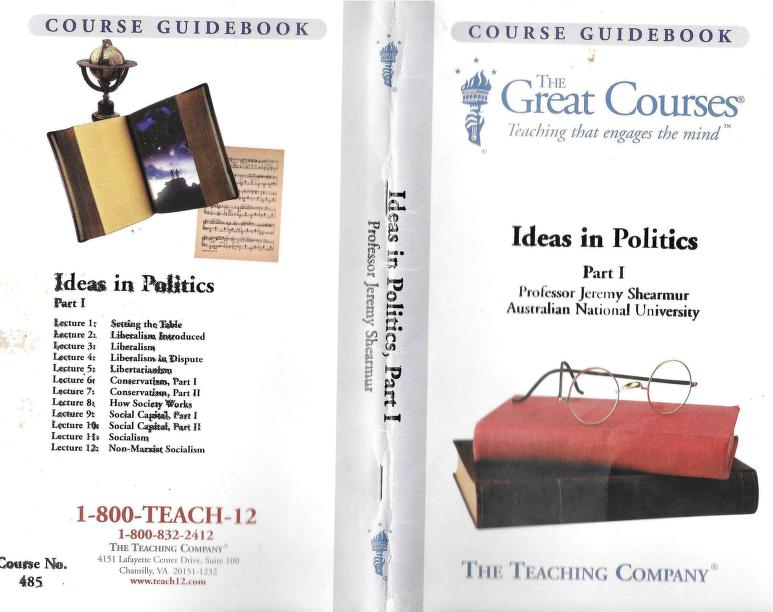
Ideas in Politics [TTC Audio]
English | 2001 | 12 hrs and 19 mins | MP3 | 338 MB
Ideas in Politics
Course Number 487 24 lectures (30 minutes/lecture)
Taught by: Dr. Jeremy Shearmur Australian National University
The aim of his course is not to take sides on any public issue, but rather to explain what is at stake, and to improve your own grasp of why those on all sides of many widely discussed public questions be they liberals, socialists or libertarians, radical feminists or religious conservatives think as they do.
Dr. Shearmur s work is thus not persuasion, but clarification. And he accomplishes it through an analysis that is more profound, cogent, philosophically informed, and comprehensive than anything you re ever likely to glean from ordinary news coverage or day-to-day political commentary.
Questions to Consider
Dr. Shearmur begins with questions that you have probably asked at one time or another, questions such as:
What is meant by ideology? Is it something I have, or only something that those who disagree with me happen to harbor?
Is political debate a series of disputes over how best to realize ideals that we all hold in common, or are those who support differing programs and policies truly striving for quite different and distinct ideals?
Is politics really driven purely by subrational motives such as material interests, or can ideas make a difference?
And if ideas do matter, what precisely are the schools of thought that inform our political discourse today? Where do they come from? How have they changed over time? And how do they interact with one another to form our public sphere?
Dr. Shearmur shows that most of our current public controversies from tax and welfare policy to issues touching on feminism, free speech, or the public status of homosexuality can be understood as arguments within a larger liberal tradition.
As he sees it, four related but seriously differing schools of thought contend over questions such as "What motivates us?" "What is true human flourishing?" and "What should our ideals be, and what kinds of institutions and programs best realize them?"
How Ideas Affect Issues
Dr. Shearmur invites you to consider how ideas flowing from principles held by these schools of thought apply to real issues such as taxes, welfare, the environment, feminism, free speech, Americans declining civic and political participation, and more.
As regards participation, a striking discussion has been opened up by the Harvard political scientist Robert Putnam. In an essay and later a book titled Bowling Alone, he has argued that Americans are increasingly less likely to belong to voluntary groups and associations of all kinds, and that this will have serious consequences for everything from personal health to our whole political system.
Putnam s evidence, his proposed solutions, what they say about where we are now and where we are going, and the responses of his critics from across the spectrum all will come in for your consideration.
Socialism, Ecology, and Feminisms
Both Marxian and non-Marxian socialists offer moral critiques of the existing social order. Some of the latter, along with certain liberal theorists, have recently argued that welfare liberalism and socialism share much ground, that the former even perhaps points to the latter. What is the basis of such arguments, and what do critics of various stripes make of it all?
Should ecological concerns prompt us to embrace extensive regulation or the international redistribution of resources? Are there market-based solutions to environmental problems? And what of "deep ecology," the view that ecological systems should be considered valuable in themselves, and should impose moral constraints upon human action?
Three lectures on feminism begin by exploring the work of John Stuart Mill on the social situation of women in the mid 19th-century, and his ideas for improving it. The American feminist Betty Friedan critically appraised those improvements from the standpoint of the early 1960s, thereby launching the feminist movement as we know it today.
Is feminism essentially an offshoot of liberalism, exposed to the same questions? What of variants such as the socialist and "radical" feminisms of the 1970s or the "difference feminism" that flows from the work of psychologist Carol Gilligan, and which has influenced the outcome of actual court cases?
Finally, we look at responses of liberal feminists to criticisms of liberalism by other feminists, and at conservative responses to feminism. From feminism, we turn to other political ideas that bring issues of identity into the heart of politics.
Who Belongs? Nationalism and Multiculturalism
The next phase of your reflection focuses on nationalism and multiculturalism as they affect politics both globally and locally. Again, you ll get to the root of current controversies by looking at how the politics of identity developed, and at the arguments that go on between supporters and critics.
This, in turn, leads us to issues relating to homosexuality, not least because some homosexuals have taken multiculturalism as a model for their own politics. Also worth considering are the ideas of journalist and commentator Andrew Sullivan, who makes a distinctively non-multicultural and even conservative case for gay marriage. The ideas of Sullivan s critics, both religious conservatives and homosexuals influenced by "queer theory," also come into focus in Dr. Shearmur s evenhanded treatment.
The debate over gay marriage raises vital questions of a more general character, concerning the relationship between religious and secular authority, and, more generally, religion and politics in Western societies.
Hence the need for lectures on the questions of free expression and pornography. Disagreements over these issues, Dr. Shearmur suggests, shed much light on how both liberalism and conservatism see the world.
Do Political Ideas Have a Future?
Finally, your survey of today s political discourse closes with a question raised by the collapse of the Soviet Union: Is there really any room left for serious arguments about ideas in politics, or has history shown decisively that liberal democracy is the only answer to political questions?
Such a viewwhich echoes the liberal theme that liberalism is the fate of everyonewas explored by Francis Fukuyama. He made his case strikingly in his famous 1989 essay "The End of History?" and later in his 1992 book, The End of History and the Last Man.
Is Fukuyama (assuming his own views have remained consistent!) correct? Are we all liberals (or soon-to-be liberals) now?
Dr. Shearmur caps your intellectual tour of the modern political landscape by asking how people who hold the various ideas studied in the lectures might best respond to Fukuyama s argument.
Will history go on, or has the scope of political ideas narrowed, for better or worse, in some final way? Not easy questions to answer, but you ll be able to make an informed try after absorbing these 24 revealing talks from an exceptionally lucid and levelheaded student of politics today.
Should I buy Audio or Video?
This course works well in either audio or video. The video version is illustrated with portraits and on-screen graphics.
Part I
Lecture 1: Setting the Table
Lecture 2: Liberalism Introduced
Lecture 3: Liberalism
Lecture 4: Liberalism in Dispute
Lecture 5: Libertarianism
Lecture 6: Conservatism, Part I
Lecture 7: Conservatism, Part II
Lecture 8: How Society Works
Lecture 9: Social Capital, Part I
Lecture 10: Social Capital, Part II
Lecture 11: Socialism
Lecture 12: Non-Marxist Socialism
Part II
Lecture 13: Socialism Problems & Objections
Lecture 14: Ecological Ideas, Part I
Lecture 15: Ecological Ideas, Part II
Lecture 16: Feminism
Lecture 17: Problems of Liberal Feminism
Lecture 18: Feminism Concluded
Lecture 19: Nationalism
Lecture 20: Multiculturalism
Lecture 21: Gay & Lesbian Politics
Lecture 22: Religion & Politics in the West
Lecture 23: Toleration, Censorship & Pornography
Lecture 24: The End of History
What Do Ideas Have To Do With Politics?
By Dr. Jeremy Shearmur
"My goal in this course is to introduce you to some of the leading ideas in modern political life, the types of arguments that go on around them, and the impact that they make, not least, on our practical understanding of how we live and govern ourselves.
"But you might say, "It s not ideas that matter in politics. It s interests. If you want know how people are going to view things, how they are going to vote, and the line that various politicians will take, you need to know their interests. Ideas? Surely not!"
"Or you might also say, 'But look at all the people involved in politics who have no intellectual interests, and wouldn t know an idea if it hit them in the face!'
"I will offer a response that was penned by John Maynard Keynes in his 1936 book, The General Theory of Employment, Interest, and Money
'The ideas of economists and political philosophers, both when they are right and when they are wrong, are more powerful than is commonly understood.
'Indeed, the world is ruled by little else. Practical men, who believe themselves to be quite exempt from any intellectual influences, are usually the slaves of some defunct economist. Madmen in authority, who hear voices in the air, are distilling their frenzy from some academic scribbler a few years back.
'I am sure that the power of vested interests is vastly exaggerated compared with the gradual encroachment of ideas. It is ideas, not vested interests which are dangerous for good or evil.'
"This is an impressive quotation, but I must confess that merely to quote from an Englishman, however distinguished, does not by itself settle the argument.
"But consider a hypothetical U.S. carmaking firm. In a sense its interests are obvious to make the highest profits it can. But take the analysis to another level: Should the firm support global free trade? You need some ideas about economics and about human motivation to answer that question.
"And whatever answer, the firm and its agents need to know how to argue for or against free trade as a public policy. In other words, political ideas are indispensable, even for the most hardheaded and self-interested among us."
Code:
https://nitroflare.com/view/AEE0945645ACAE3/Ideas_in_Politics_(24_lectures)_-_Jeremy_Shearmur.rar
Code:
https://rapidgator.net/file/d44ac3c3256aae698e71aabdff44d232/Ideas_in_Politics_(24_lectures)_-_Jeremy_Shearmur.rar.html
OP
Member
LEVEL 6
260 XP
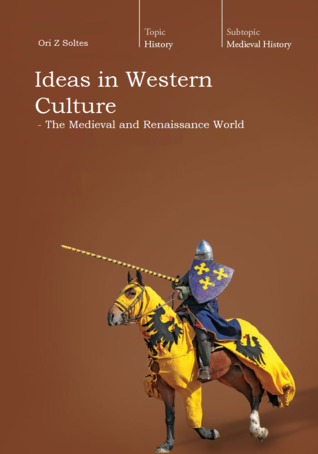
Ideas in Western culture: the medieval and renaissance world [TTC Audio]
English | 1995 | 14 hrs and 37 mins | MP3 | 446 MB
Authors: Ori Z. Soltes, Teaching Company
Examination of period from Constantine's conversion to the growth of doubt during the seventeenth century, illustrated with a wide variety of literary and visual art.
20 lectures on 4 cassettes.
1. The barbarians and the medieval world --
2. The struggle to define Christendom --
3. Medieval literature and poetic tradition --
4. The fringes of western Europe --
5. Church and state --
6. Symbols of faith --
7. Questions of faith and understanding --
8. Ideas and images --
9. Knights of romance --
10. Morality, entertainment and human fellowship --
11. Street language becomes literature --
12. Renaissance humanism --
13. Esoteric humanism and human form --
14. Educating the powerful and the privileged --
15. From heaven to earth --
16. Vision and revision --
17. From earth to heaven --
18. April fool's day --
19. Myth, history, power and family --
20. Religious wars and individual reflections
Code:
https://nitroflare.com/view/294F8EEDEE9B24A/Ideas_in_Western_Culture-_The_Medieval_and_Renaissance_World.rar
Code:
https://rapidgator.net/file/32ce3f44df7006c493bc878e71eca459/Ideas_in_Western_Culture-_The_Medieval_and_Renaissance_World.rar.html
OP
Member
LEVEL 6
260 XP
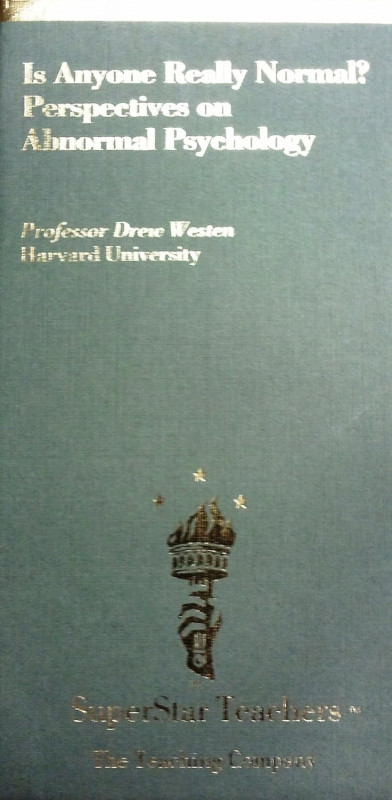
Is Anyone Really Normal? Perspectives on Abnormal Psychology [TTC Audio]
English | 1994 | 5 hrs and 58 mins | MP3 | 123 MB | Drew Westen
Human beings can't just stick to the facts. Human beings always impose order on what they see. Beginning with the assertion that there are "no facts" in the study of psychology, Professor Drew Westen reveals the intriguing and varied ways that psychologists have explained reality.
For much of this century, we have accepted that Freud was to the mind what Newton had been to the physical universe, having mapped the topography of the psyche and having explained the movement of the forces within it. The reverence for Freud has waned with the rise of other perspectives on the understanding and treatment of disorders, which suggests a different model of human mental life.
In this course, Professor Westen brings this clash of perspectives into the open and suggests ways in which they might inform each other and afford us a more comprehensive understanding of ourselves and others. The lectures are designed to be accessible to anyone interested in the mysteries of the abnormal mind and its treatment. Professor Westen examines the ways in which a psychologist s perspective determines how abnormalities are seen and treated ... or even if treatment is needed at all.
Lecture 1: How Perspectives Influence Us.
Lecture 2: Freud; from dreams to drives.
Lecture 3: Freud's Theories of Motivation & Development.
Lecture 4: Psychoanalytic Theory of Conflict.
Lecture 5: Contemporary Psychodynamic Thinking.
Lecture 6: Behaviorist Alternative.
Lecture 7: Cognitive Social Approaches; the role of situations & thought.
Lecture 8: Cognitions, Social Behavior, & Cognitive Behavioral Therapies.
Drew Westen is Professor, Departments of Psychology and Psychiatry at Emory University. Prior to joining the faculty at Emory, he taught at the University of Michigan, Harvard Medical School, and Boston University. He has received numerous teaching awards, including the first Golden Apple Award for outstanding undergraduate teaching at the University of Michigan, and more recently was selected as a G. Stanley Hall Lecturer by the American Psychological Association.
Code:
https://nitroflare.com/view/013B3CDC7C178C3/Is_Anyone_Really_Normal_-_Perspectives_On_Abnormal_Psychology.rar
Code:
https://rapidgator.net/file/ce10f43e71380cf2c7a1e27796decf27/Is_Anyone_Really_Normal_-_Perspectives_On_Abnormal_Psychology.rar.html
OP
Member
LEVEL 6
260 XP
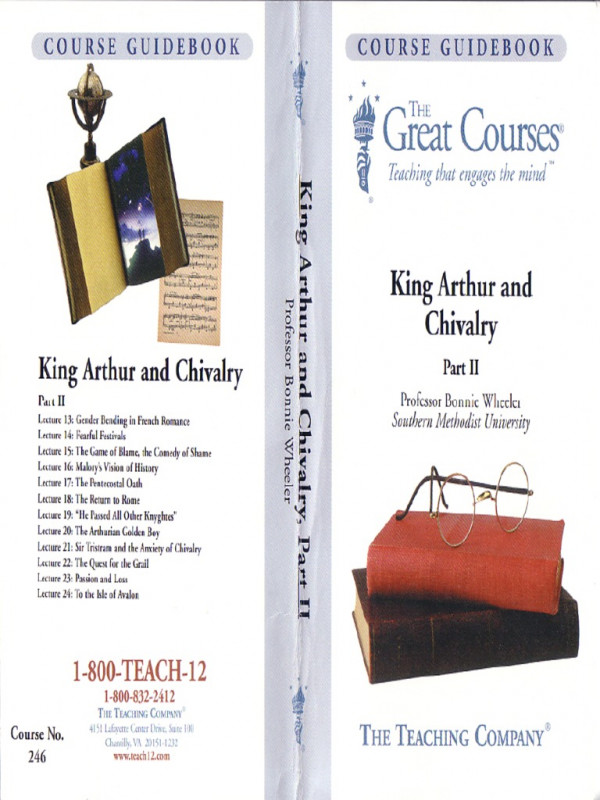
King Arthur and Chivalry [TTC Audio]
English | 2001 | 12 hrs and 24 mins | MP3 | 170 MB
(24 lectures, 30 minutes/lecture)
Course No. 247
Taught by Bonnie Wheeler
Southern Methodist University
Ph.D., Brown University
These 24 lectures, taught by the editor of the only scholarly quarterly in the world devoted solely to Arthurian lore, invite you to explore the time-honored and timeless legends of King Arthur and their links to the world of chivalry in the literature of the Middle Ages.
Professor Bonnie Wheeler shows why she has won teaching award after teaching award as she blends historical analysis with the study of literature to heighten your understanding of both.
Professor Wheeler offers this searching lecture series on the great chivalric romances of the Middle Ages and their tales of knightly quests, courtly love, and an extraordinary place called Camelot.
These lectures trace the development of the chivalric mentality in literature and thought from the Middle Ages to modern times.
You discuss texts including:
The Dream of Rhonabwy
The Song of Roland
Andreas Capellanus's On Love
Poem of My Cid
Silence
Chr tien de Troyes's Erec and Enide, Yvain, and Lancelot
Sir Gawain and the Green Knight
Malory's Le Morte Darthur.
The Lore of King Arthur: "More, and better besides!"
"As a teacher," says Professor Wheeler, "I never meet anyone who can talk to me for more than two minutes about King Arthur and Camelot without asking, Is it true?'
"In response, I often want to quote Winston Churchill: And more and better, besides!' "
There are few figures in literature as compelling as Arthur and his knights. Why?
"In contrast to the starkly individual heroism of ancient epic, Arthur's world is one where there are many different heroes, where each can be heroic in a special way," notes Professor Wheeler. "This gives Camelot and the Round Table a unique and original appeal that is still strong today.
"This is important and fascinating because chivalric life itself was so closely modeled on literature, on the stories of Arthur and his court," she continues.
Drawing from folklore, archaeology, history, and literary studies, Dr. Wheeler evaluates knighthood and chivalry as historic institutions and ideals. Then she builds on that understanding in order to shed light on the great Arthurian stories that we have inherited from the High Middle Ages and which continue to fascinate readers today.
From Legend to Literature
The course starts with the flowering of chivalry in the 12th-century West. The stories and literature of King Arthur form the central thread around which Professor Wheeler weaves studies of chivalry.
Tracing the rich story cycle (or "legendary") of King Arthur and his knights from the mists of the Dark Ages to the edge of modernity, Professor Wheeler devotes the first two-thirds of her course to compelling treatments of topics including:
scholars' efforts to pinpoint the Arthur story's origins in the history and folklore of post-Roman Britain, and to find its traces on the British landscape
early written accounts of Arthur, especially Geoffrey of Monmouth's History of the Kings of Britain (ca. 1138), the medieval Latin blockbuster that painted an unforgettable portrait of Arthur as the ideal monarch
the beautiful use made of Arthurian characters and narratives by the French poet Chr tien de Troyes, whose romances vividly portray both the glories and the paradoxes of the chivalric ideal
the recently rediscovered romance Silence, which tells the story of a young woman raised as a boy to save her from disinheritance
the comparative perspective on Arthur offered by a look at other great medieval heroes
the exquisite 14th-century English poem Sir Gawain and the Green Knight, in which Camelot's Christmas revels are interrupted by a hulking visitor with a very strange proposal
how the chivalric hero and the Arthurian moment become permanently bonded in the "matter of Britain"
the reality of chivalry in medieval society, which lets us ask how close the literature of chivalric romance came to real life.
Malory's Masterpiece
The last third of the course is devoted to Sir Thomas Malory's late 15th-century masterpiece, Le Morte Darthur.
No previous literary version of the Arthurian story is as complete. The fiction provides biography with the individual stories of Arthurian knights (Arthur, Lancelot, Gareth, Gawain, Tristram, and Galahad, primarily), and it provides the overarching framework of Round Table history from inception to destruction as the symbol of the civilization represented.
Malory's Le Morte Darthur is a work that stands on the frontier of the Middle Ages. The one surviving manuscript of Malory's work was finished by 1470; England's first printer, William Caxton, used this, as well as another manuscript, when he printed his version of the text in July of 1485 during the terrible English civil war known as the War of the Roses.
Malory's moving and brilliant treatment of such famous Arthurian themes as the Grail Quest, the love affair between Guenevere and Lancelot, and the final battle of Arthur and Mordred has left a deep mark on all of English literature.
Although fairly little is known about Malory himself, his sprawling, magnificent prose narrative is the most influential and resonant telling of the Arthurian story in English.
In offering the fullest account of Arthur's birth, life, and disappearance to the Isle of Avalon, Malory looks deeply into the passions, pains, and achievements of the Knights of the Round Table. We see how King Arthur's Round Table is born, flourishes, and is extinguished.
To see Arthur and the Round Table fellowship through Malory's eyes is to enter into a singularly intense yet ambiguous historical vision that blends sober narrative with wild tales of adventure and probes the depths, heights, and limits of the chivalric way of life.
Arthur's Court: Coming Home
"Traces of chivalric life are gloriously reflected in medieval literature, especially as it was pressed into the mold of King Arthur and his companions," notes Professor Wheeler.
"These stories are full of marvelous and poignant episodes, adventures that sweep us along but always leave us wonderingabout the true nature of love, of wisdom, of courage, and of sanctity.
"Yet that doesn't require that those who are characters in the fiction question their world at all. They just have to figure out how to live excellently, and to succeed as those who will have the right kind of story to bring home, because Arthur's court is always the place that everyone calls home."
"Should I buy Audio or Video?"
The video format contains several dozen images and paintings that help to tell the stories of the Arthurian legends. There is also useful on-screen text to make clear definitions, foreign words, and selected texts. This course works well in any format.
lecture 1. Arthur in history and legend ;
lecture 2. In search of Arthur ;
lecture 3. The land and its stories ;
lecture 4. The matter of Britain ;
lecture 5. Two Welsh tales ;
lecture 6. Dreaming Arthur ;
lecture 7. Honor, shame, and largesse ;
lecture 8. Knighthood and how it grew ;
lecture 9. The lover's curriculum ;
lecture 10. The round table in French ;
lecture 11. Lancelot and Guenevere ;
lecture 12. Yvain, the Knight of the Lion
lecture 13. Gender bending in French romance ;
lecture 14. Fearful festivals ;
lecture 15. The game of blame, the comedy of shame ;
lecture 16. Malory's vision of history ;
lecture 17. The Pentecostal oath ;
lecture 18. The return to Rome ;
lecture 19. He passed all other knyghtes ;
lecture 20. The Arthurian golden boy ;
lecture 21. Sir Tristram and the anxiety of chivalty ;
lecture 22. The quest for the grail ;
lecture 23. Passion and loss ;
lecture 24. To the Isle of Avalon
Code:
https://nitroflare.com/view/FE71FE43A06717B/King_Arthur_and_Chivalry.rar
Code:
https://rapidgator.net/file/b30bef6503d8e644ac69eec990dee14d/King_Arthur_and_Chivalry.rar.html